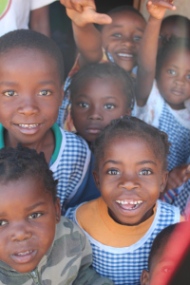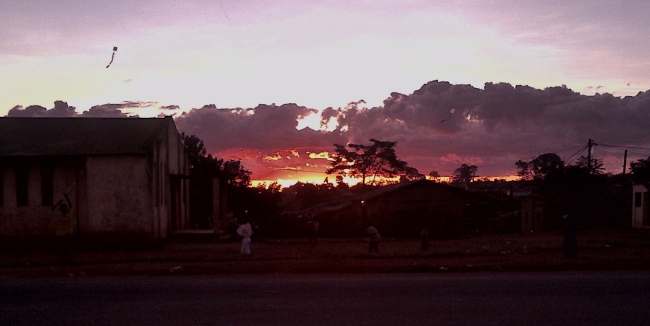
sunset on lake niassa at new years
I started writing this post on the second-to-last night of 2012. Maybe I should have kept it as a private journal entry, but I decided to share it here, so bear with me when I get emo and/or wordy.
As December came to a close, the following activities were a given: 1) Christmas and 2) todo o mundo taking stock of the past year. However, I found both really challenging this year.
I’ll start with Christmas. I think December is a hard time for all PCVs, especially here in Mozambique as we remember the loss of Lena and Alden in last year’s accident. As Christmas got closer, I couldn’t even decide what I wanted to do for the holidays. Well, I knew what I WANTED: to be at home with my family. For the first and only time since last Christmas, I was homesick. But as I listened to “I’ll be home for Christmas” and “I’m dreaming of a white Christmas” and “It’s beginning to look a lot like Christmas/everywhere you go/but the prettiest sight to see/is the holly that will be/on your own front door,” I knew it wasn’t in the cards. (Also, man, Christmas songs can really be maudlin).
So, while chanting under my breath “I’llbehomefornextyearI’llbehomefornextyear,” I contemplated my options here in Mozambique. My neighbors were rehearsing with the church choir for Christmas masses, and our Australian missionary friends said I’d be welcome at their various activities, from a ladies night gift swap to an evening of caroling. But Christmas at site had been lonely last year, and despite my vastly increased levels of integration with the church ladies AND the aussies, I was nervous about a repeat.
If I stayed in Lichinga, I’d also have to juggle those activities with the plans of my new sitemates, Jade & Ella, who were hosting Christmas their fellow newbies. They’re truly great– I’m so happy to have the whole Moz 19 crew in Niassa, and I had an awesome time with them at the lake for New Year’s. But I knew Christmas with them wouldn’t be quite the same as the elaborate dinner parties I’d grown used to with Chris and Jon. I miss both of those boys a ton, and haven’t FULLY indoctrinated their replacements into our system of carefully planned events with elaborate themes & many lists posted on the whiteboard. Don’t worry, I’m working on it.
In the end, I spent Christmas with my fellow Moz 16ers on the beach in Pemba. I was excited to visit Cabo Delgado province (the last of the eleven in Moz for me to pass through). And, of course, the poolside dance party on Christmas night was pretty fun. It was totally worth the 3 days of travel each way– even with 8 different rides on the last day, including one in the back of a pickup truck with an entire dead cow laying next to us & an old man negotiating the price to marry me.
That being said, I still felt melancholy during my stay in Pemba. And it was more than just the holiday. For the past few weeks, I’ve struggled with anxiety and the blues. I’m not dealing with any particular challenges; as always, my site/job/friends/family are awesome. (Well, my computer did die & my keys fell down the latrine, but that’s par for the course here in Moz). I’ve simply felt daunted by my to-do list & lacked the umph needed to tackle projects and keep up solid routines. So, despite the close of the year & my 18 month anniversary in Moz, I mentally shied away from the summing up & self-evaluation that would usually accompany those milestones.
When a few friends put up year-end blog posts, I felt a pang of that good ol’ inadequacy. I’ll give some examples why. Tory quit her job and traveled through asia for 6 weeks with her boyfriend. Dan ran 1,348.6 miles, kept track of that statistic, AND got married. Jaema declared 2012 her best year ever, with getting engaged as the icing on the cake. And Sam, in her words, “married a wonderful guy and read a ton of books.” (And yes, I will be the only single person left in America by the time I get home.)
But then I read the actual posts by these lovely people. At first, I was overwhelmed by how much I miss my friends. But then I realized they’ve all been a big part of my life this year, despite being far away. Tory’s travel log kept me entertained on my 11-hour train ride after Christmas, and I fiend for her seasonal playlists until I manage to download them every few months. She also reserved the hotel room for her, me & Kate’s reunion at Sam’s wedding. My Victoria Falls marathon adventure clearly showed Dan’s influence on me from afar, and I was honored to be recognized at him & Steph’s wedding as the guest who had traveled the furthest to be there. I got a few shoutouts at Sam’s wedding as well, and her blog has guided my selections from the vast Peace Corps kindle library. An email exchange with Jaema about relationships & gratitude yielded insights that I know will stick with me for years to come, and she was an amazing hostess for several days of running, lattes, yoga, sushi & exploring Brooklyn.
Then I thought about all the people I interacted with on the day I sat down to write this post– within a 12-hour window on December 30th. I met a really sweet older man who coordinated our NYE lake trip. I talked to my 8-year-old neighbor buddy Toria about rites of initiation, and she claimed that her baby brother has learned how to say my name. I taught three ladies how to make American bolo (cake) and showed them pictures my mom had sent of snow in the Poconos. I hung out with the whole crew of Moz 19ers. I had a great chat with two Australians traveling through Lichinga. I wished the mayor a happy New Year when I ran into him at the liquor store. And I ended the day with a hilarious homily from an 80-year-old Mozambican priest about how women shouldn’t drink whiskey.
After considering these experiences from the past year & the past day, I realized that all my worries about where I should be/with whom/doing what were besides the point. The people who are important to me are part of my life & always will be, whether I’m physically with them or not. And the experiences I have wherever I am depend not on my choice of itinerary but on how I engage. The fact that I wish I could be so many places, and that I am in fact here for right now, isn’t a reason to be sad– it’s amazing & shows how lucky I am. And, yes, with such amazing opportunities it can be hard to live up to my standard of how much I should be giving back. But structuring my life isn’t about making to-do lists or finding the best format for my database; it’s way, way more simple than that. It’s about loving people. It’s about loving my friends, my family, my neighbors, all the people I’m trying to serve, and everyone who’s important to me. It’s about loving them no matter where they are, or when I’ll see them, or how much we have in common. This is the way to connect with the people I’m with & the people I wish I could be wish.
This is all incredibly simple, not even worthy of an Eat/Pray/Love movie, but it took a conscious shift in how I was thinking about things. Which, not coincidentally, is what Jaema and Dan both blogged about. To be a total nerd, I will include here a quote from Dan’s running blog:
In the words of a mighty wizard, “All we have to decide is what to do with the time that is given to us.” As I continue to move forward in life, keeping close ties with old friends and meeting new people, I’m thrilled that I can do it all by doing what the human body does best: run. With every additional mile, I am reminded not only that I am fulfilling an evolutionary goal, but that happiness is a choice and not a consequence. Some people run because they feel they have to – to lose weight or to mitigate the effects of a greasy meal. I run because I want to, because I enjoy every step.
…And on that note, I bid ye all a Happy New Year. May you achieve your goals, learn from your mistakes and keep pressing onwards with an insatiable desire to live. Because we must always remember that whatever we do in this sport, we do ourselves. Sometimes we receive encouragement from others and in certain instances we might get swept up in someone else’s training plan. But at the end of the day, what you do and the choices you make are yours. You plan, you prepare, you follow through and lastly, you learn.
I can truly say that I learned a lot this year, and my resolution to love others is another way of saying that I want to keep learning; I want to be open to people & experiences, and to how I can contribute while also letting them change me.
Running and church are two of the ways I think about important things & keep myself on the right track, so I’ll switch here from the former to the latter. One of the readings at mass on the day I wrote this post said the following:
Brothers and sisters:
Put on, as God’s chosen ones, holy and beloved,
heartfelt compassion, kindness, humility, gentleness, and patience,
bearing with one another and forgiving one another,
if one has a grievance against another;
as the Lord has forgiven you, so must you also do.
And over all these put on love,
that is, the bond of perfection.
What struck me is that, after the laundry list of good things like compassion, humility and forgiveness, St. Paul says: “and over all of these put on love.” I have plenty of lists myself, including lists of accomplishments for 2013. Finish my Peace Corps service! Get into grad school! Attend my 5-year college reunion! But over all of these, I should put on love. So what I’m stating as my new year’s resolution, inelegant an simplistic as it may be, is to “love everyone, a lot, all the time.” 2012 was full of once-in-a-lifetime experiences that I’ll never forget, and if I follow my resolution for 2013, I believe I’ll remember this year with pride as well.







